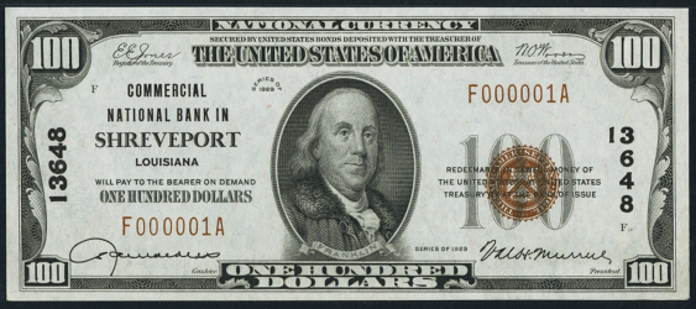One Hundred Dollar Notes › Nationals › 1929 One Hundred Dollar National Bank Notes › Vermont Charters › 1929 $100 Swanton Vermont National Union Bank
Get Value Now
| Item | Info |
|---|---|
| Series | 1929 |
| Charter | #1634 National Union Bank of Swanton, Vermont |
| Year Chartered | 1866, 39 Banks Chartered |
| City Info | Swanton is a town in Franklin County, Vermont. The population was 6,427 at the 2010 census. The town includes the village of Swanton. The town of Swanton was chartered in 1763 as one of the New Hampshire Grants by Benning Wentworth, the governor of the Province of New Hampshire. It was named for Captain William Swanton, an officer in the British Army who had traveled through the area during the French and Indian War. Source: Wikipedia |
| Similar Cities | If your note doesn't match try: 1. Swanton, Vermont - Ferris National Bank 2. Swanton, Vermont - Peoples National Bank |
| Seal Varieties | Small Brown |
| See Also | If your note doesn't match try: 1. 1929 $100 Federal Reserve Bank Note 2. 1928 $100 Federal Reserve Note 3. 1928A $100 Federal Reserve Note 4. 1934 $100 Federal Reserve Note 5. 1934A $100 Federal Reserve Note 6. 1934B $100 Federal Reserve Note |
| Other Info | 1. Value depends on notes known for charter, condition and market demand. |
| Neat Fact | Issued in sheets of 6 Note (Friedbergs, 20th Ed. P193) |
No Obligations Offers and Appraisals
Please submit a good photo or scan. It will be identified and evaluated. Understand there may be subtle differences between the image you see above and your note. Signatures, design, markings and note condition will determine the offer price. Notes in Uncirculated or better condition receive the best offers.
Appraisals can be estimated for wholesale and retail prices. Wholesale is what dealers typically pay. Retail is what a collector might pay. Retail is slightly higher in most cases.
Please visit this page for USA Paper Money Reference. Do not treat this page as a reference guide, it is for appraisal and acquisition purposes only.
